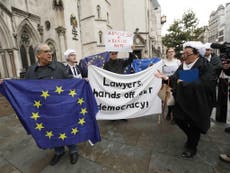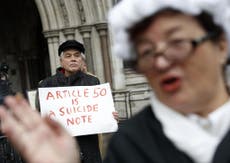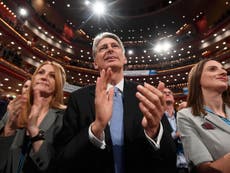The Independent's journalism is supported by our readers. When you purchase through links on our site, we may earn commission.
Britain, these are the five realistic choices for Brexit – take your pick
Brexit 1 would be the most preferable. Brexit 2 would be preferable to Brexit 3. Brexit 4 would be an economic disaster, and Brexit 5 is a libertarian fantasy


As we know, the referendum was all about “taking back control”. And now Government ministers and right-wing newspapers seem to want to wrestle back control of the English language from sly “Remoaners”.
“There is no such thing as a choice between soft Brexit and hard Brexit,” Theresa May recently informed us.
“We don’t recognise this distinction between hard Brexit and soft Brexit…We want the right Brexit,” echoed the Chancellor, Philip Hammond.
For the Daily Mail, talk of hard Brexit is the “newspeak of Orwell”.
And Michael Gove complains that the label is designed to create nasty associations in the mind of the public, associations with things like “learning hard lessons, facing a hard landing or doing hard labour”.
This seems oddly defensive. Is the Brexit project really so fragile that some semantic framing from the defeated Remainers risks derailing it?
And, in truth, there’s plenty of spin on both sides, as the recent attempt by Brexiteers to talk up a “clean Brexit” demonstrate.
Yet let’s meet the Brexiteers halfway. Let’s forget labels and talk economic and institutional reality. Below are five different sorts of Brexit arrangements for the UK that could plausibly emerge by 2019.
Brexit 1
The UK would leave the EU. We would have no members of the European Parliament, no seat on the European Council of leaders and no substantive role in setting the rules of the single market. Yet we could do all this and still remain in the single market and possibly also the EU customs union. This would mean paying an annual contribution into the EU budget.
The UK would also have to accept free movement of people, although it might be able to negotiate some restrictions on flows in times of “serious economic, societal or environmental difficulties” in the manner of Norway and Liechtenstein. Brexit 1 would keep disruption for UK firms trading with Europe to a minimum.
Brexit 2
The UK leaves the EU and remains in the single market and customs union, as in Brexit 1, but only for a temporary period while a new long-term trade agreement is forged with the EU. The UK could also use this period to negotiate new trade deals with the rest of the world.
As in Brexit 1, this would also be a course that would minimise disruption for British-based businesses.
This would also have the advantage of buying the UK precious time, since many trade experts are doubtful the two-year deadline for EU exit after Article 50 is triggered is long enough for Britain to negotiate a new deal with the rest of the EU and also the other countries with which the UK currently freely trades as part of the EU.
Incidentally, such a transition deal was recommended by Raoul Ruparel, the new adviser to the Brexit Secretary, David Davis, when Ruparel was at the Open Europe think tank.
Brexit 3
Britain leaves the EU and also the single market and the customs union but signs a comprehensive free trade deal with the rest of the European Union. This would be welcomed by goods exporters to Europe. Yet it would also entail costly customs checks.
There would additionally have to be a customs border between Northern Ireland and the Republic, with potentially serious political consequences.
And if the deal did not cover services (as free trade deals generally do not), our services exporters to Europe – in particular our financial services firms – would be severely disadvantaged.
It is possible that a special services deal could be done with the rest of the EU, whereby the UK effectively replicates EU regulation under an “equivalence” regime – although this would obviously mean applying EU rules while having no input into their design.
Brexit 4
Leave the single market and customs union with no free trade deal in place and trade with Europe under World Trade Organisation rules. WTO rules mean that the EU would impose its Common External Tariff on UK exporters.
Analysis by The Independent suggests this would create an initial hit to UK exporters of at least £4.5bn – and in reality the damage would be many times that.
The UK could also impose tariffs on goods imports from Europe, provided these were no higher than those charged on other countries’ imports. This would bring in more tax revenue. But tariffs on imports would also push up import prices and domestic inflation.
Furthermore, if the UK failed to conclude free trade deals with the 52 other countries with which the UK currently trades freely as an EU member the same would follow: damaging tariffs on UK exports and imports.
Brexit 5
Leave the single market and customs union with no free trade deal – but unilaterally scrap all import tariffs. This would permit a flood of cheap food, cheap goods and cheap commodity imports into the UK. This would also push down prices in the shops. But it would have a catastrophic impact on our farmers and manufacturers and all those who work in those sectors.
It would be politically explosive since, by Government choice, the exports of our industries would be subject to tariffs abroad, but imports from foreign competitors would not be. Also, under this Brexit, the UK would not even seek to strike free trade deals, meaning there would be zero help for our services firms, which are the dominant part of our economy, in breaking into foreign markets and bypassing their non-tariff barriers.
So how should we think about these Brexits? Brexit 1, to me, would be easily the most preferable, albeit much inferior to full EU membership. Brexit 2 would be preferable to Brexit 3. Brexit 4 would be an economic disaster. And Brexit 5 is simply a libertarian fantasy that will not happen because it is politically impossible.
Oxford Economics estimates that Brexit 1 and 2 would see the British economy smaller by 2030 relative to otherwise by between 0.1 and 1.8 per cent. It estimates that Brexit 3 would diminish output by between 0.8 per cent and 3.1 per cent by that date, and Brexit 4 by between 1.5 per cent and 3.9 per cent.
The Economists for Brexit group claim Brexit 5 would deliver a UK growth boom by 2020. But economists at the London School of Economics say this is ideologically driven pseudoscience and that unilateral free trade would, in fact, reduce UK GDP by between 6.3 per cent and 9.5 per cent by 2030, equivalent to between £4,200 and £6,300 per household.
“A rose by any other name would smell as sweet,” says Shakespeare’s Juliet. The reverse is true too.
Call the various Brexit settlement scenarios what you want – but the reality is that some will inflict much greater harm on British households and businesses than others.




Join our commenting forum
Join thought-provoking conversations, follow other Independent readers and see their replies